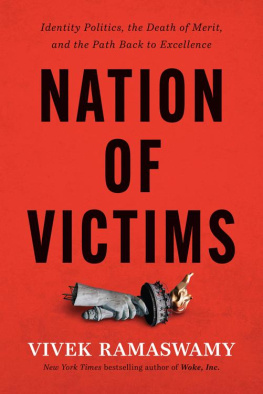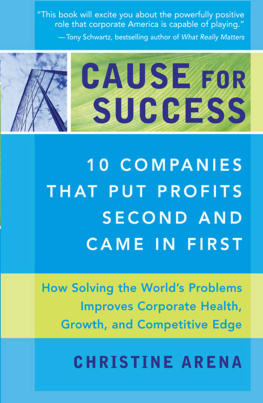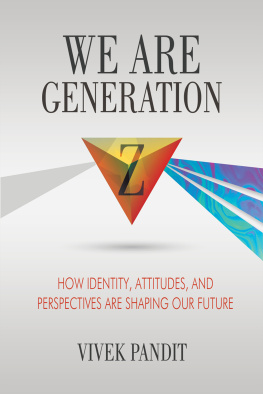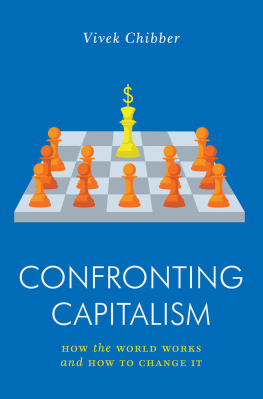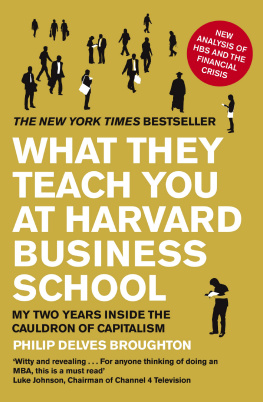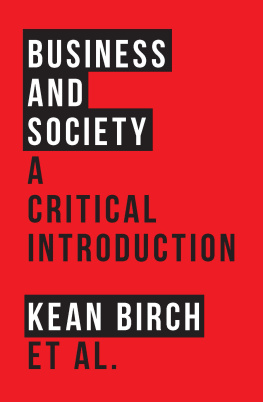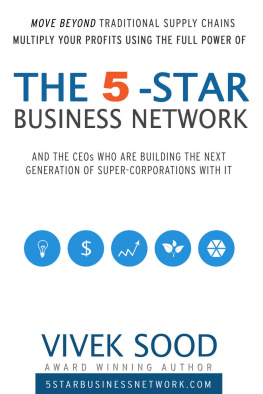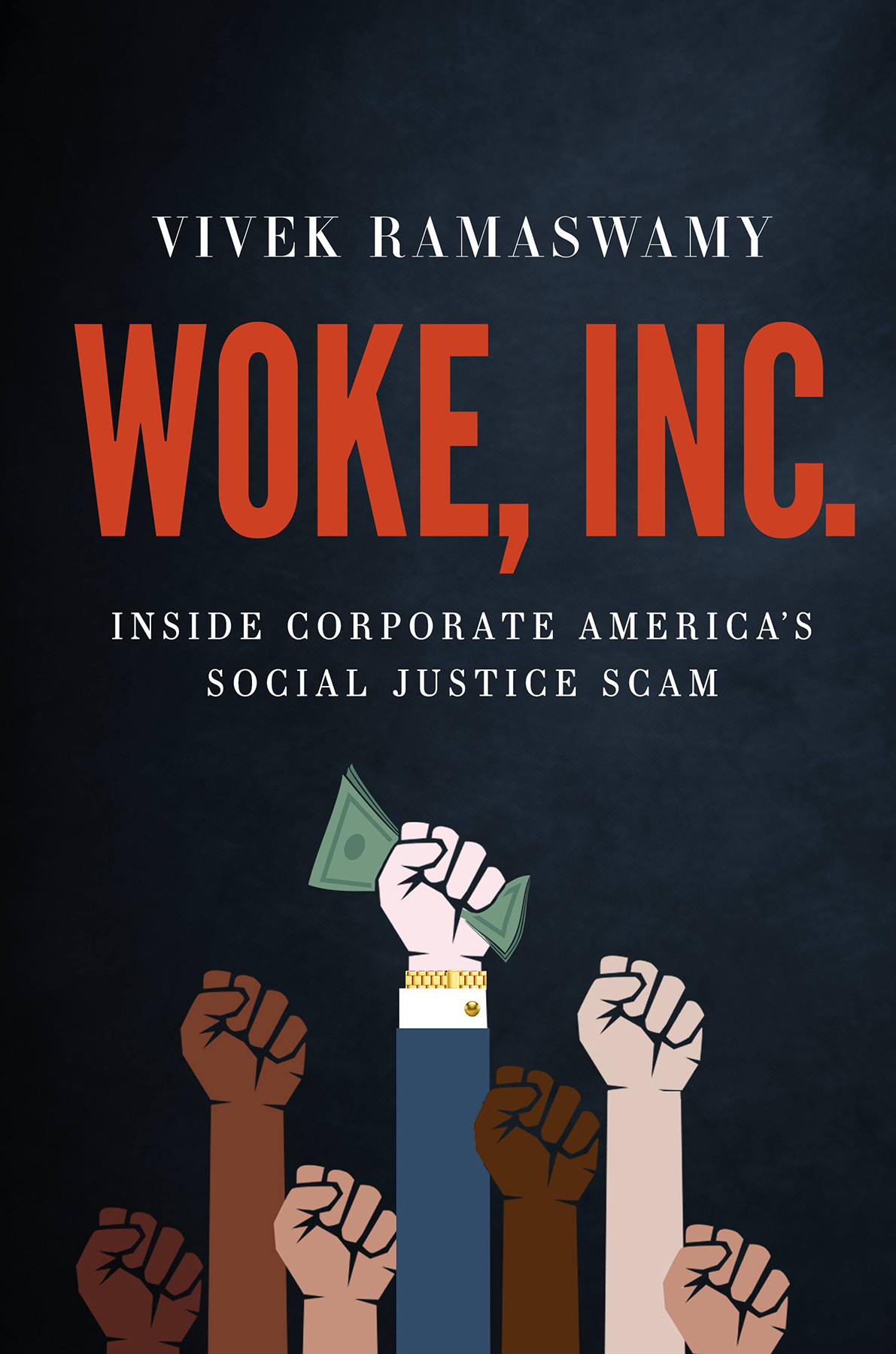
Copyright 2021 by Vivek Ramaswamy
Cover design by Christopher Tobias. Cover copyright 2021 by Hachette Book Group, Inc.
Hachette Book Group supports the right to free expression and the value of copyright. The purpose of copyright is to encourage writers and artists to produce the creative works that enrich our culture.
The scanning, uploading, and distribution of this book without permission is a theft of the authors intellectual property. If you would like permission to use material from the book (other than for review purposes), please contact permissions@hbgusa.com. Thank you for your support of the authors rights.
Center Street
Hachette Book Group
1290 Avenue of the Americas, New York, NY 10104
centerstreet.com
twitter.com/centerstreet
First Edition: August 2021
Center Street is a division of Hachette Book Group, Inc. The Center Street name and logo are trademarks of Hachette Book Group, Inc.
The publisher is not responsible for websites (or their content) that are not owned by the publisher.
The Hachette Speakers Bureau provides a wide range of authors for speaking events. To find out more, go to www.HachetteSpeakersBureau.com or call (866) 376-6591.
Library of Congress Cataloging-in-Publication Data has been applied for.
ISBNs: 978-1-5460-9078-6 (hardcover), 978-1-5460-5982-0 (ebook)
E3-20210619-JV-NF-ORI
TO MY SON KARTHIK, AND TO HIS GENERATION.
M Y NAME IS VIVEK RAMASWAMY , and I am a traitor to my class.
Im going to make some controversial claims in this book, so its important you know a bit about me first. My parents immigrated from India forty years ago to southwest Ohio where I was born. They werent rich. I went to a racially diverse public school with kids who came from difficult backgrounds. After I got roughed up in eighth grade by another kid, my parents sent me to a Jesuit high school where I was the only Hindu student and graduated as valedictorian in 2003. I then went to Harvard to study molecular biology and finished near the top of my class. Rather than becoming an academic scientist, I joined a large hedge fund in 2007 and started investing in biotech. A few years later I became the youngest partner at the firm.
In 2010, I had an itch to study law, so I went to Yale while keeping my job at the fund. After law school, I started a biotech company called Roivant Sciences. My goal was to challenge big pharmas bureaucracy with a new business modelwhich proved to be easier said than done. I started by developing a drug for Alzheimers disease that resulted in the largest biotech IPO in history at the time, though a few years later that drug failed spectacularly. Failure hurt, and I was chastened by it. Thankfully the company went on to develop important drugs for other diseases that helped patients in the end. Ive also co-founded a few tech companies along the way, one that I sold in 2009 and another of which is fast-growing today, and now Im philanthropically active in a number of nonprofit ventures. I know how the elite business world worksand elite academia and philanthropy toobecause Ive seen it firsthand.
I used to think corporate bureaucracy was bad because its inefficient. Thats true, but its not the biggest problem. Rather, theres a new invisible force at work in the highest ranks of corporate America, one far more nefarious. Its the defining scam of our timeone that robs you of not only your money but your voice and your identity.
The con works like a magic trick, summed up well by Michael Caines character in the opening monologue in Christopher Nolans movie The Prestige:
Every great magic trick consists of three parts or acts. The first part is called The Pledge. The magician shows you something ordinary: a deck of cards, a bird or a man. The second act is called The Turn. The magician takes the ordinary something and makes it do something extraordinary. But you wouldnt clap yet. Because making something disappear isnt enough; you have to bring it back. Thats why every magic trick has a third act, the hardest part, the part we call The Prestige.
Financial success in twenty-first-century America involves the same simple steps. First, the Pledge: you find an ordinary market where ordinary people sell ordinary things. The simpler, the better. Second, the Turn: you find an arbitrage in that market and squeeze the hell out of it. An arbitrage refers to the opportunity to buy something for one price and instantly sell it for a higher price to someone else.
If this were a book about how to get rich quick, Id expound on these first two steps. But the point of this book is to expose the dirty little secret underlying the third step of corporate Americas act, its Prestige. Heres how it works: pretend like you care about something other than profit and power, precisely to gain more of each.
All great magicians master the art of distractionflashing lights, smoke, beautiful women on stage. Todays captains of industry do it by promoting progressive social values. Their tactics are far more dangerous for America than those of the older robber barons: their do-good smoke screen expands not only their market power but their power over every other facet of our lives.
As a young twenty-first-century capitalist myself, the thing I was supposed to do was shut up and play along: wear hipster clothes, lead via practiced vulnerability, applaud diversity and inclusion, and muse on how to make the world a better place at conferences in fancy ski towns. Not a bad gig.
The most important part of the trick was to stay mum about it. Now Im violating the code by pulling back the curtain and showing you whats really going on in corporate boardrooms across America.
Why am I defecting? Im fed up with corporate Americas game of pretending to care about justice in order to make money. It is quietly wreaking havoc on American democracy. It demands that a small group of investors and CEOs determine whats good for society rather than our democracy at large. This new trend has created a major cultural shift in America. Its not just ruining companies. Its polarizing our politics. Its dividing our country to a breaking point. Worst of all, its concentrating the power to determine American values in the hands of a small group of capitalists rather than in the hands of the American citizenry at large, which is where the dialogue about social values belongs. Thats not America, but a distortion of it.
Wokeness has remade American capitalism in its own image. Talk of being woke has morphed into a kind of catchall term for progressive identity politics today. The phrase stay woke was used from time to time by black
These days, white progressives have appropriated stay woke as a general-purpose term that refers to being aware of all identity-based injustices. So while stay woke started as a remark black people would say to remind each other to be alert to racism, it would now be perfectly normal for white coastal suburbanites to say it to remind each other to watch out for possible microaggressions against, say, transgender peoplefor example, accidentally calling someone by their pre-transition name. In woke terminology, that forbidden practice would be called deadnaming, and microaggression means a small offense that causes a lot of harm when done widely. If someone committed a microaggression against black transgender people, we enter the world of intersectionality, where identity politics is applied to someone who has intersecting minority identities and its rules get complicated. Being woke means waking up to these invisible power structures that govern the social universe.


